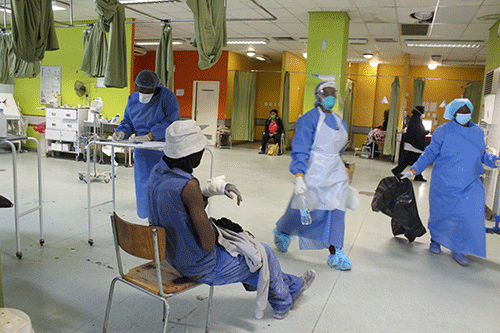While new Covid-19 infections have skyrocketed in the last two weeks, most experts are confident local hospitals can cope with the new wave but remain worried about low vaccination rates.
President Hage Geingob will this afternoon provide an update on the country’s Covid-19 response.
“Covid-19 kills, the new Omicron variant is highly infectious and our behaviour should change,” he said on Twitter yesterday. Namibia has recorded a significant number of 3 392 active Covid-19 cases within a week, a jump from 679 recorded over a week ago. In the latest update shared yesterday, health minister Dr Kalumbi Shangula announced cases from nine regions with Khomas reporting the highest number of new cases, totalling 128, making up 53.1% of the total confirmed cases.
“We should not read too much in these indicators. We must continue to exercise maximum caution and practice public health measures so that we change the course of the pandemic trajectory,” cautioned Shangula.
Furthermore, Shangula said hospitals are coping well with admissions, as not many people who test positive require hospitalisation.
“The number of active cases are 3 392, of which 72 are hospitalised, three are in an intensive care unit (ICU). Seven of the hospitalised cases are fully vaccinated. All cases in ICU are not vaccinated,” stated Shangula.
By 11 December 2021, a total of 387 413 people have received one dose of the Covid-19 vaccine, of which 93 615 have received the Johnson & Johnson vaccine, administered as one dose.
Of this number, 214 are children aged 12-17 years, while 232 575 adults had received two doses which sums up 326 185 having completed the vaccination.
Shangula added 615 people have received third doses of Sinopharm.
He stated that there has been a significant decrease in the number of new infections and the positivity ratio as compared to the last reporting cycle.
“Last year this time, we were in the second wave which peaked in mid-December 2020,” recalled Shangula.
He said the ministry is not testing for the variant as it is present in the country but they are trying to find out how far it has spread.
“In Namibia, both the Delta and Omicron variants are circulating. We don’t need to test a variant every time. We have already established that Omicron is present in Namibia,” said Shangula.
The general manager of the Lady Pohamba Private Hospital Hannelie Botha said hospitalised patients are not showing severe symptoms, adding the facility is well capacitated to take on the workload.
“It is not like it was during the third wave, so our hospitalisations are usually three to five days. We are well capacitated,” said Botha.
With the slow vaccination rate, it is proving to be difficult to contain the virus, considering the aspect of it mutating with the existence of the Omicron strain that was detected in the country recently.
Robert Swayzer, the acting country director for Centres for Disease Control (CDC) in Namibia, said vaccination is one of a range of prevention measures, and all of these measures need to be applied to effectively stop the spread of Covid-19.
“Regardless of the circulating SARS-CoV 2 variant at any given time, the methods by which the virus spreads from person to person remain the same, and as such, the highly effective mitigation measures remain the same too. This applies to the Omicron variant,” said Swayzer.
“We have spent the last couple of months living life a bit more normally, however, the number of cases seems to be rising. We must take this seriously and implement any measures that we may have eased to better prevent the spread of infection.
“Through these prevention measures, we have the opportunity to change how severely Namibia will experience the fourth wave.”
Swayzer added it is important to protect the most vulnerable in society who are most likely to be worst affected by the health impacts of Covid-19, regardless of the variant.
“These most vulnerable include the elderly, people with suppressed immunities such as those with cancer, advanced or untreated HIV disease, and those with other chronic comorbidities such as high blood pressure, diabetes, asthma and others,” added Swayzer.
In terms of disease control, he said there are measures in place that are effective at preventing the spread of Covid-19.
“These include correctly wearing a mask covering both nose and mouth, physical distancing, avoiding crowded areas and reducing gathering size where possible, maximising ventilation, and hand washing.
Covid-19 vaccines are available countrywide and this is one of the most effective ways to reduce the impact of the virus,” said Swayzer.


